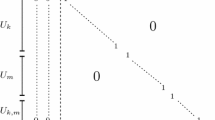Abstract
We consider the bilevel knapsack problem with interdiction constraints, a fundamental bilevel integer programming problem which generalizes the 0–1 knapsack problem. In this problem, there are two knapsacks and n items. The objective is to select some items to pack into the first knapsack such that the maximum profit attainable from packing some of the remaining items into the second knapsack is minimized. We present a combinatorial branch-and-bound algorithm which outperforms the current state-of-the-art solution method in computational experiments for 99% of the instances reported in the literature. On many of the harder instances, our algorithm is orders of magnitude faster, which enabled it to solve 53 of the 72 previously unsolved instances. Our result relies fundamentally on a new dynamic programming algorithm which computes very strong lower bounds. This dynamic program solves a relaxation of the problem from bilevel to 2n-level where the items are processed in an online fashion. The relaxation is easier to solve but approximates the original problem surprisingly well in practice. We believe that this same technique may be useful for other interdiction problems.









Similar content being viewed by others
References
Kleinert, T., Labbé, M., Ljubić, I., Schmidt, M.: A survey on mixed-integer programming techniques in bilevel optimization. EURO J. Comput. Optim. 9, 100007 (2021)
Dempe, S.: Bilevel Optimization: Theory, Algorithms, Applications and a Bibliography. In: Dempe, S., Zemkoho, A. (eds.) Bilevel Optimization: Advances and Next Challenges, pp. 581–672. Springer, Cham (2020)
Smith, J.C., Song, Y.: A survey of network interdiction models and algorithms. Eur. J. Oper. Res. 283(3), 797–811 (2020)
DeNegre, S.: Interdiction and discrete bilevel linear programming. PhD thesis, Lehigh University (2011)
Caprara, A., Carvalho, M., Lodi, A., Woeginger, G.J.: A study on the computational complexity of the bilevel knapsack problem. SIAM J. Optim. 24(2), 823–838 (2014)
Von Stackelberg, H.: The Theory of the Market Economy. Oxford University Press, England (1952)
Chen, L., Wu, X., Zhang, G.: Approximation algorithms for interdiction problem with packing constraints. arXiv preprint arXiv:2204.11106 (2022)
Pisinger, D.: Where are the hard knapsack problems? Comput. Operations Res. 32, 2271–2284 (2005)
Caprara, A., Carvalho, M., Lodi, A., Woeginger, G.J.: Bilevel knapsack with interdiction constraints. Informs J. Comput. 28(2), 319–333 (2016)
Tang, Y., Richard, J.-P.P., Smith, J.C.: A class of algorithms for mixed-integer bilevel min-max optimization. J. Glob. Optim. 66, 225–262 (2016)
Fischetti, M., Ljubić, I., Monaci, M., Sinnl, M.: A new general-purpose algorithm for mixed-integer bilevel linear programs. Oper. Res. 65(6), 1615–1637 (2017)
Fischetti, M., Ljubic, I., Monaci, M., Sinnl, M.: Interdiction games and monotonicity, with application to knapsack problems. Informs J. Comput. 31, 390–410 (2019)
Lozano, L., Bergman, D., Cire, A.A.: Constrained shortest-path reformulations for discrete bilevel and robust optimization. arXiv preprint arXiv:2206.12962 (2022)
Fischetti, M., Monaci, M., Sinnl, M.: A dynamic reformulation heuristic for generalized interdiction problems. Eur. J. Operations Res. 267, 40–51 (2018)
Della Croce, F., Scatamacchia, R.: An exact approach for the bilevel knapsack problem with interdiction constraints and extensions. Math. Program. 183(1), 249–281 (2020)
Pisinger, D.: An expanding-core algorithm for the exact 0–1 knapsack problem. Eur. J. Oper. Res. 87(1), 175–187 (1995)
Weninger, N., Fukasawa, R.: A Fast Combinatorial Algorithm for the Bilevel Knapsack Problem with Interdiction Constraints. In: Del Pia, A., Kaibel, V. (eds.) Integer Programming and Combinatorial Optimization, pp. 438–452. Springer, Cham (2023)
Kellerer, H., Pferschy, U., Pisinger, D.: Knapsack problems. Springer, Berlin, Heidelberg (2004)
Martello, S., Pisinger, D., Toth, P.: Dynamic programming and strong bounds for the 0–1 knapsack problem. Manag. Sci. 45(3), 414–424 (1999)
Tahernejad, S., Ralphs, T.K., DeNegre, S.T.: A branch-and-cut algorithm for mixed integer bilevel linear optimization problems and its implementation. Math. Program. Comput. 12(4), 529–568 (2020)
Fontan, F.: Knapsack Solver (Github source code repository). https://github.com/fontanf/knapsacksolver. Accessed 20 Mar 2023 (2017)
Dolan, E.D., Moré, J.J.: Benchmarking optimization software with performance profiles. Math. Program. 91(2), 201–213 (2002)
Funding
We acknowledge the support of the Natural Sciences and Engineering Research Council of Canada (NSERC), [funding reference numbers RGPIN-2020-04030 and CGSD-2023-578589].
Author information
Authors and Affiliations
Corresponding author
Ethics declarations
Conflict of interest
All authors declare that they have no conflict of interest.
Additional information
Publisher's Note
Springer Nature remains neutral with regard to jurisdictional claims in published maps and institutional affiliations.
An extended abstract of this paper appeared in the proceedings of IPCO 2023.
Rights and permissions
Springer Nature or its licensor (e.g. a society or other partner) holds exclusive rights to this article under a publishing agreement with the author(s) or other rightsholder(s); author self-archiving of the accepted manuscript version of this article is solely governed by the terms of such publishing agreement and applicable law.
About this article
Cite this article
Weninger, N., Fukasawa, R. A fast combinatorial algorithm for the bilevel knapsack problem with interdiction constraints. Math. Program. 210, 847–879 (2025). https://doi.org/10.1007/s10107-024-02133-9
Received:
Accepted:
Published:
Issue Date:
DOI: https://doi.org/10.1007/s10107-024-02133-9




